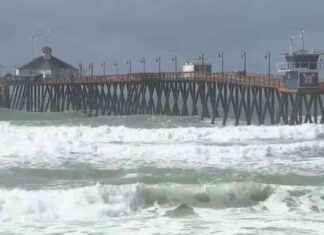The only candidate who advocated peace with Ukraine will finally not be able to run in the presidential elections that will be held on March 15, 16 and 17 in Russia. Veteran politician Boris Nadezhdin announced this Thursday that the Central Electoral Commission (CEC) had refused to register him to run in the elections and face the president of Russia, Vladimir Putin, whose re-election is more than certain.
Before announcing what happened in a Telegram message, the Commission explained that it had found too many invalid signatures among the 105,000 that Nadezhdin’s team presented on January 31.
Every candidate who runs for election without a party behind them with representation in Parliament must collect a certain number of endorsements. Those, like Nadezhdin, who have extra-parliamentary political training (Civic Initiative) had to present 100,000 valid endorsements.
Of the signatures supporting Nadezhdin, the Electoral Commission declared 9,147 invalid. That represents more than 5% allowed to register the candidate.
After learning this information, the politician proposed to the CEC to postpone the decision on his registration. But its president, Ella Pamfilova, explained that the body is obliged to move forward and cannot adapt to the needs of a particular candidate. The official deadline to accept or reject candidates’ registration is February 10.
The already rejected candidate showed his disagreement with the decision on his Telegram channel. “I do not agree with the decision of the Electoral Commission (…) I will appeal to the Supreme Court of Russia,” he promised.
“I have collected more than 200,000 signatures throughout Russia. We have done the collection in an open and honest way: the queues at our offices and collection points were seen all over the world,” he explained. “Taking part in the 2024 presidential elections is the most important political decision of my life. I am not going to give up my intentions.”
On the same day, the Commission also denied registration as a candidate to Sergei Malikovich, a candidate for the Communists of Russia party, a small party that split from the Communist Party of the Russian Federation in 2012.
When 60,000 signatures had been verified, officials certified that there were 8,979 invalid signatures, already exceeding the 5% allowed. Pamfilova said the decision “was made unanimously.”
At the moment, the Russian Electoral Commission has registered four presidential candidates for next month’s presidential elections. Leonid Slutski, leader of the nationalist Liberal-Democratic Party; Nikolai Kharitonov, for the Communist Party; and Vladislav Davankov, from Gente Nueva, did not have to present signatures of support because they are supported by their parties, with parliamentary representation.
The fourth is Vladimir Putin. The Russian president decided to run as an independent, without the support of his party, United Russia, and had to gather 300,000 signatures. He submitted them at the end of January and was registered.
The figure of Boris Nadezhdin, a 60-year-old veteran politician little known in Russia, became a surprise last January, when thousands of Russians began to line up to give him their support, both inside the country and in some offices installed abroad.
The absence of a substantive opposition to Putin, most of whose representatives are in prison or in exile, allowed such an attraction. Some important figures, such as the exiled former oil magnate Mikhail Khodorkovsky or the team of the imprisoned Alexei Navalni, showed their support.
But above all he has told of his critical position towards the Kremlin’s policy in Ukraine. As a candidate he has promised the end of the war and the return of those mobilized. When talking about the “special military operation”, the official name given to the conflict, he said that it seemed to him “a fatal mistake.” He also promised the release of Russia’s political prisoners.
With liberal positions (at the beginning of the century he was a deputy for the now defunct Union of Right Forces), today he is a councilor in Dolgoprudni, a city of 120,000 inhabitants 20 kilometers from Moscow.
Despite this position, some voices critical of the Kremlin have suggested that Nadezhdin, who has regularly participated as a guest on television programs about the conflict, could not have gotten here if power had not allowed it, something he has denied. .
In fact, another anti-war candidate, journalist Yekaterina Duntsova, was disqualified by the CEC in December, citing defects in the application and documents submitted to register as a candidate for the elections.
Kremlin spokesman Dimitri Peskov, who a few weeks ago said that Nadezhdin was not a serious rival for Putin, defended the work of the Commission on Thursday. This has done its job by demanding respect for the rules, he assured. “We have heard from the CEC that there have been a large number of errors in the signatures and that it has invalidated a large number of them. That is, this important criterion has not been met,” he noted.








